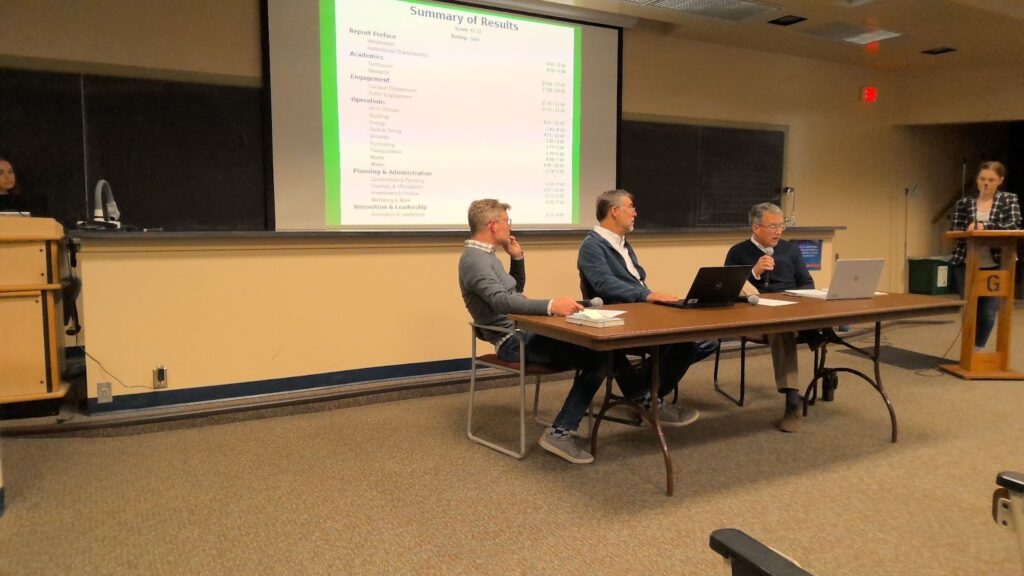By Brandon Fey, Staff Writer

STARS panel discusses the results of the campus sustainability report. (L-R) Jeff Rioux, Randy Wilson, Jim Biesecker and discussion facilitator Molly Hoffman ’24. (Photo: Brandon Fey, The Gettysburgian)
The Sustainability Tracking Assessment & Rating System (STARS) is a self-reporting framework for colleges and universities to measure their overall sustainability performance. It is administered by the Association for the Advancement of Sustainability in Higher Education (AASHE). In 2022, Gettysburg College submitted this report for the third time and received its results this year.
STARS grades institutions on their environmental efforts on all aspects of campus including academics (curriculum and research), engagement operations (on campus and with the public), planning and administration and innovation and leadership.
Gettysburg College submitted to STARS in 2011 and 2016, though this year, it received a score of 67.33, earning for the first time a “Gold” rating as a clear improvement from the “Silver” of previous years.
The results of the report were discussed on Wednesday, Nov. 8th, 2023, in the Mara Auditorium of Master’s Hall by a school panel composed of Associate Vice President of Facilities Jim Biesecker, Professor of Environmental Studies Randy Wilson, and Director of the Center for Public Service Jeff Rioux. The panel was organized by Environmental Studies student Molly Hoffman ’24.
Hoffman introduced the panel and primed the event, speaking on the importance of caring for the environment for the sake of justice and equality, rather than solely for ratings.
Biesecker began by speaking on the importance of communication and collaboration across campus to improve sustainability initiatives, despite some inherent limitations in comprehensive reporting to the STARS rating system.
Some of the campus sustainability efforts enacted through facilities have included a sustainable purchasing policy that holds the college accountable for choosing sustainably responsible purchases when possible (envisioned by Hoffman with the support of AASHE), LEED (Leadership in Energy and Environmental Design) building certifications, green-certified dining services, and ongoing process of transitioning the college’s transportation fleet to electric and hybrid vehicles.
“In that six-year period (between the two most recent STARS submissions) we saw a lot of investments on campus… steam line improvements, upgrading to LED lighting on campus, implementing a composting program (with Servo)… started a student-led bike share program, and have added Evie charging stations.”
The panelists then discussed some of the inevitable barriers in place of certain sustainability aspirations including a lack of awareness from the student body of ongoing initiatives and limited resources. According to the speakers, it can be difficult to enact sustainable programs without implementing them without investing money upfront to account for their costs, and proposed changes to the Gettysburg curriculum have not been embraced. Some ideas, such as campus-wide composting, require unavailable land and labor and would require approval from the National Park Service.
One of the considerations of STARS is a sustainably-conscious orientation program. This began for the students this year with the sustainability fair to great success, though Professor Wilson discussed his plan to further this effort by working alongside the human resources department to provide an employee orientation on sustainability practices on campus.
Rioux suggested some ideas for student organizations to reduce waste, such as creating a commemorative cup for events that people may reuse, to reduce the use of disposable cups.
The event concluded with Hoffman thanking the panelists and audience members for participating in the discussion and encouraging continued engagement with sustainability initiatives at Gettysburg College.
